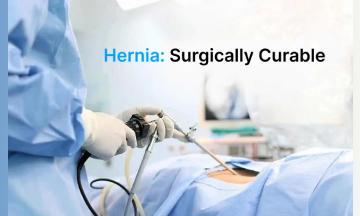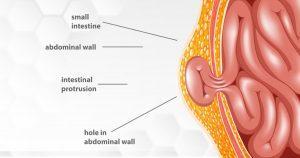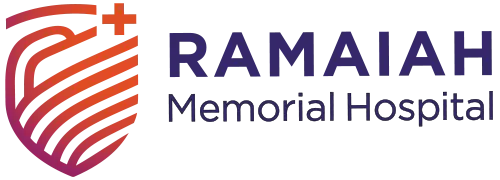Hernia: Surgically Curable

What is Hernia?
This can be explained as a weakness in the Abdominal wall which leads to protrusion of the contents of the abdominal cavity outside of the abdominal wall leading to a visible swelling. Common people come to OPD by telling they have a “Hernia”.
It comes with certain risk factors like:
- people straining at stools or constipation for a prolonged period of time
- prolonged chronic cough, smoking tobacco
- Difficulty/straining while voiding urine (old age with benign prostate hypertrophy)
- Following major surgeries especially in women with a previous cesarean or hysterectomy surgical procedures.
How can you really identify it’s a hernia?

Firstly, if you notice any swelling over the abdominal wall which either increases on coughing and reduces on lying down you should be thinking about a hernia.
Experiencing pain while lifting weights or pain while coughing, presence of bulge in the groin area, increase in the bulge over time, dull aching sensation over the groin.
if you experience any of this it’s an ideal time to see a surgeon.
Warning signs of hernia.
If you have left a swelling unattended one must watch for these to prevent complications.
Nausea with vomiting not reducing with simple medications.
Severe colicky pain in the abdomen.
Unable to pass Flatus.
These may lead to complications of existing hernia like strangulation or intestinal obstruction and these should be urgently evaluated.
If any of these are present along with swelling over the abdomen or groin one must reach out to the doctor immediately.
Treatment aspects of hernia
Hernia has a wide range of surgery methods with the upcoming advancements a few of which are described below:
Open hernia Repair with mesh placement
Being the most common procedure used by most of the surgeons it has its own pros and cons.
The advantages being it is one of the best choices in complicated hernias, Incisional hernias and the most commonly adopted procedure in case of the difficult operating fields.
Disadvantages being
- Prolonged Hospital Stay
- Delayed wound healing
- Cosmetically bigger scar
- Increased Post-operative care
Laparoscopic Techniques (Minimally Invasive Procedures)
–Transabdominal Preperitoneal Mesh placement:
It is done using laparoscopic instruments with minimal incisions of about 1cm over the abdominal wall followed by placing of the mesh and securing it with Tackers.
-Totally Extraperitoneal -Advanced Laparoscopic procedure:
It requires greater skills in laparoscopic dissection and manipulation as the working space available is limited.
–Extended Totally Extraperitoneal Rives-stoppage:
It is an approach for ventral Hernia it is a Novel surgical technique usually done to handle huge defect space.
These Procedures give an added advantage of cosmetically better scar and also early discharge from the hospital and early healing.
Post Operative Care is something that every surgeon emphasizes as it’s the earliest step that must be approached to return to a healthier life.
- In Hernia surgery a few of the most important measures are that one must take care of the surgical site hygiene and wound care.
- One must avoid lifting heavy weights as it can cause weakness of the abdominal wall and may lead to recurrence.
- One must take stool softeners to avoid constipation and straining.
- Avoid smoking.
- Protein rich and a high fibre diet is recommended not only for post operative hernia cases but also as a routine lifestyle modification for a healthier life.
We, at Ramaiah Memorial Hospital, aim for a near painless surgery and work towards a quick recovery of the patient.
Laparoscopic surgeon

